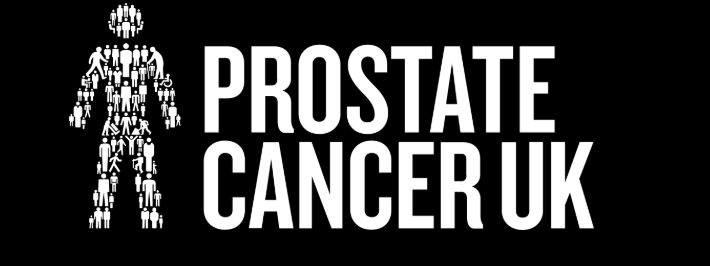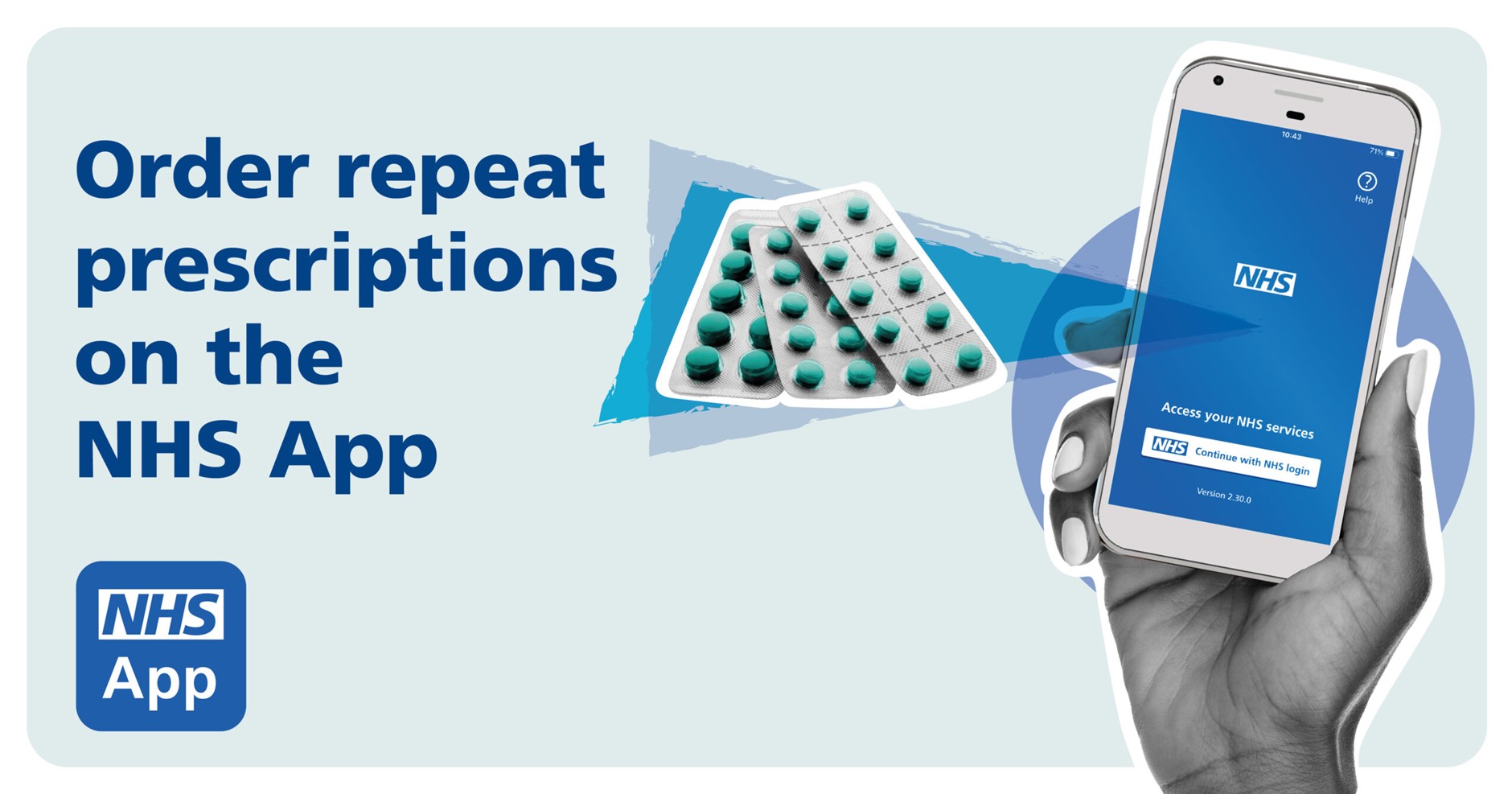Keep up to date with our latest news
Keep up to date with our latest news, events and announcements.
Information from Leeds Teaching Hospitals NHS Trust:
We would like to update you on issues affecting blood tests at GP practices in Leeds and part of Bradford.
The Pathology Service at Leeds Teaching Hospitals NHS Trust has recently implemented a new Laboratory Information Management System.
This is a shared system across West Yorkshire which will provide a single, seamless solution for processing pathology testing for patients having blood tests. This will allow patient test results to be viewed by clinicians across the region, regardless of where a test was obtained, and ultimately deliver a better experience for patients.
This has been a large, complex transition. Leeds hospitals receive around 10 000 blood samples every day, and the majority of these samples have been processed as usual. However, during the transition they experienced some technical issues, which impacted some patients from Leeds and Bradford who had blood samples taken at their GP practices and community centres. The result of this was that some blood tests results were delayed or were not processed, and some were sent in a format which meant that GP practices could not file them into their systems. There are a large number of technical and clinical staff in the trust and in community teams who are actively working on addressing these issues as a priority. The main technical issues are now fully resolved, and the majority of outstanding blood results have been sent to practices.
The Trust sincerely apologises to any patients and GP practice staff affected by this disruption.
All local pharmacies are offering the Pharmacy First service (or the similar Minor Ailments Service).
Going to your local pharmacy offers an easy and convenient way to get clinical advice on minor health concerns. Community pharmacies can offer treatment and when appropriate, some prescription medicine, for seven common conditions without patients needing to see a GP, as part of a major transformation in the way the NHS delivers care.
How it works
Simply walk into your local pharmacist and ask for some advice.
The treatment for most common conditions is about doing the right things for yourself. Your local pharmacist can now offer treatment and provide some prescription medicine for seven conditions, if appropriate, without the need for a GP appointment or prescription.
Also, remember that many pharmacies are open at weekends and evenings.
Types of conditions a pharmacist can help with
- Sinusitis (for those aged 12 years and over)
- Sore throat (for those aged 5 years and over)
- Earache (for those aged between 1 and 17 years old)
- Infected insect bite (for those aged 1 year and over)
- Impetigo (for those aged 1 year and over)
- Shingles (for those aged over 18 years old
- Uncomplicated urinary tract infections (UTIs) (for women aged 16-64)
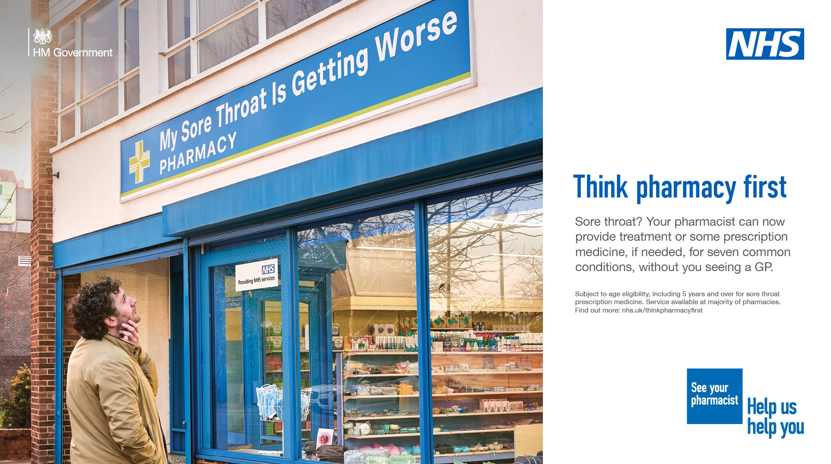
Community pharmacy teams are highly-skilled, qualified health professionals who have the appropriate clinical training to give people the health advice they need. Patients don't need an appointment and private consultation rooms are available. Pharmacy teams can also signpost to other relevant local services where necessary.
Pharmacists have always helped patients, families and carers in their communities to stay healthy and are well-placed to offer treatment for health conditions. By expanding the services community pharmacies offer, the NHS is aiming to free up GP appointments and give people more choice in how and where they access care.
The new expanded community pharmacy service, which also includes initiating oral contraception without the need to see a GP, is also providing more blood pressure check services and is part of the NHS’ plans to recover and improve access to primary care services. It aims to free up to 10 million GP appointments a year once fully implemented, making it quicker and easier for you to access healthcare in our local community and give you more choice in where and how you access care.
After you have had a consultation with the pharmacy, they will send the details through to us on the same day or on the following working day, so that the information is included in your medical record.
Don't wait for minor health concerns to get worse - think Pharmacy First and get seen by your local pharmacy team. More information is available here.
Latest Information Including Countries Affected
The UK Health Security Agency (UKHSA) has detected a case of Clade I mpox in Leeds. This is a more serious type of a rare infection, most commonly found in parts of central and east Africa. Whilst the risk of catching mpox in the UK remains low, it is helpful to be aware of some of the more common symptoms of mpox which include a skin rash or pus-filled lesions that can last 2 to 4 weeks. It can also cause fever, headaches, muscle aches, back pain, low energy and swollen lymph nodes.
What To Do If You Have Symptoms
If you have any symptoms and you, or someone you have been in contact with, have travelled to any of the countries below in the last 21 days, please do not visit a GP or health centre. Instead, call 111 or your GP practice. You will be assessed and referred to the appropriate team.
Countries affected (as at 28 November 2024)
- Democratic Republic of the Congo (DRC)
- Republic of the Congo
- Central African Republic
- Burundi
- Rwanda
- Uganda
- Kenya
- Cameroon
- Gabon
- Sudan
- South Sudan
Considerations is also being given to neighbouring countries at risk, such as:
- Angola
- Tanzania
- Zambia (subject to change - please visit GOV.UK for the most up to date information).
A rash usually appears 1 to 5 days after the first symptoms. It can be on any part of the body, including the palms of the hands, soles of the feet, mouth, genitals and anus.
For more information and a list of symptoms, please check the NHS website.
More information about mpox is also available on the UKHSA website.
A stroke strikes every 5 minutes in the UK. There are around 38,000 stroke-related deaths every year and it is a leading cause of disability. We are supporting the "NHS Face, Arms, Speech and Time (FAST)" campaign to encourage people to Act FAST, at any sign of a stroke, as every minute is vital to give patients quicker access to specialist treatment that could save their life and reduce the long-term effects of a stroke, such as a disability.
The first sign of a stroke might not seem serious. Like struggling to smile, not being able to raise your arm or slurring when you speak. Stroke symptoms can be less dramatic, painful or obvious than might be expected, but even if doesn’t seem like much, at the first sign of a stroke, call 999 straight away.
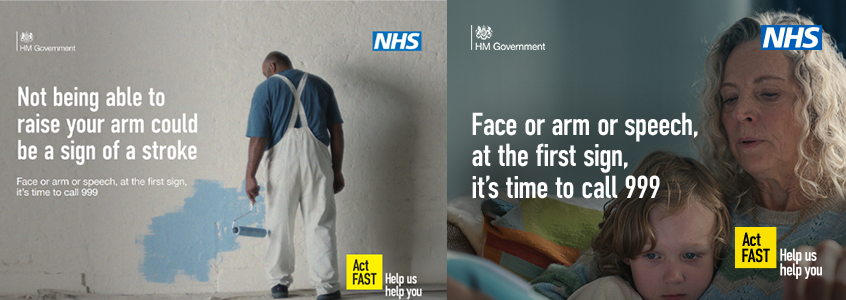
The quickest and most direct way to get your repeat prescription request to the GP is by using our online services.
If you are unable to use order your medication online, you can still make your request by post or by attending the practice.
Our practice receptionists have had additional training in ‘care navigation’ so they can help you get the right care, faster.
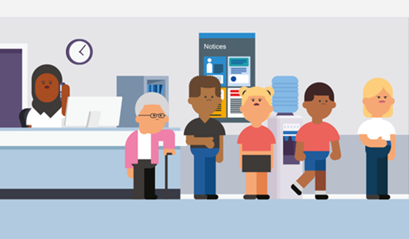
Getting you the right help more quickly
When you call the practice to make an appointment, the Receptionist/Patient Services Team may ask you to tell them a bit about why you want to see someone. You don’t need to give lots of detail or tell them anything that makes you feel uncomfortable.
Our Reception team/Patient Services Team will never offer clinical advice or triage; this new way of working is about offering you the choice to see the most appropriate professional in the practice team or elsewhere. It will often be quicker and means you may not need to see a GP at all.
By working this way, it helps to free up time for our GPs to care for patients with complex or serious health conditions that can only be managed by a GP. More importantly though, it means people are seen first by the clinician best able to manage their clinical problem.
Please don't be offended if you are asked what the problem is when you ring for an appointment. This is called Care Navigation and it's about helping you get the service you need.
The Receptionist/Patient Services Team might suggest you see an alternative professional or service, such as:
-
Pharmacy
-
Physiotherapy
-
Healthy Minds
-
Lifestyle Health & Wellbeing
-
Social prescribers
-
Prescribing Pharmacists
The choice is always yours though, and we hope next time you contact us and speak to our Reception team/Patient Services Team, you will see the value of seeing another health professional, if they are able to help.
We have selected AccuRx as our online consultation service to improve the experience for our patients.
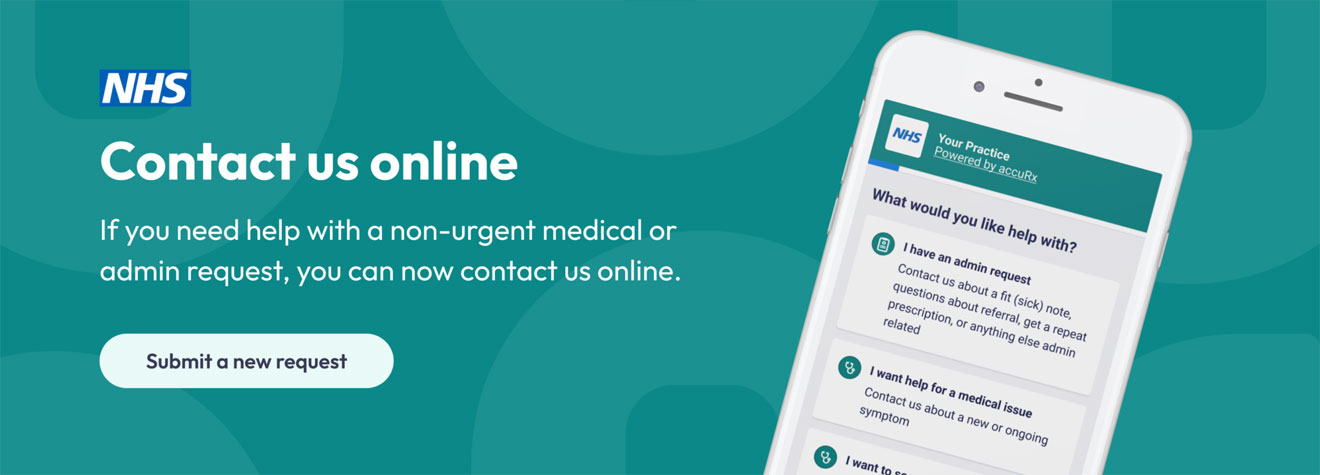
By using AccuRx, you will have easy access to a range of services at a time which is convenient to you. The online consultation service offers a secure, simple and flexible way for patients and carers to contact us, but will not replace face to face appointments.
To register for AccuRx click here.
This should not be used for emergencies. You should contact 999 or visit the Accident & Emergency Department for emergencies.
By registering, you will have easy access to a range of services from your computer or smartphone, including:
- Reporting symptoms to your GP
- Booking virtual appointments
- Accessing health advice
You can order repeat medication via the NHS App using the following link here to online services.
Another option is to order repeat medication here via AccuRx online by submitting a new request here.
- Click on the Contact us online button
- Click on the Submit a new request button
- Select Medication request via the admin query tab
- Complete the repeat prescription form and submit the request
Please allow up to 2 working days for your request to be sent to your selected pharmacy.
By post
You can post your prescription slip or written request in the post box located in reception.
Please note, we cannot accept repeat medication requests by telephone.
